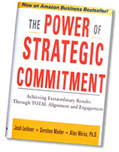
You watch how they behave. You want to feel the heat of people’s passion…of their conviction. The greatest predictor of success tomorrow is the passion and conviction of today.
It’s also crucial to understand that not everyone expresses their passion in the same way. The person who’s jumping up and down, who always jumps up and down, isn’t necessarily passionate. That’s just business-as-usual for them. Maybe when they’re sitting quietly, they’re taking it seriously.
You have to know your people and cultivate an awareness of the personalities on your team. You want to know when Frank is on fire about something. You want to know when Frank is upset about something. Then, you’ll know when Frank is just going along with something, rather than really owning it.
You need to attend to that because what you want from Frank and Joe and Mike is every bit of their conviction and passion and energy on solving the problems, beating the competition, fixing things, and making them work.
As I wrote about here, you set a standard of 100% commitment. That means whenever someone has a drop in their energy and conviction you know about it, you hear about it, and you address it. It’s not enough that people are coming to work on time. You want their hearts and their minds, not just their bodies keep the chair warm.
Next up: How to you keep that vision alive?


It’s hard though to really get to know the people around at work, because I have to take time away from work to actually spend time out of my day learning these people.
Great piece, it’s certainly something to think about and foster in the workplace.
I’ve always found that incentives are the best way to ensure people are really commited, it’s not necessarily about passion or conviction, but making sure your desires align.
I’ve always had a problem expressing enthusiasm for work, doesn’t mean I’m not. So I worry about how I’m viewed in the workplace, and whether I’m doing damage to my career, although I always dedicate myself to the actual work aspect of it well.
I’ve never given much thought to the passion levels of my workers, but I think after reading this, I’m going to explore the people around me at work a little more.
I’ve found since my group of workers under me expanded, I can no longer monitor or kow everyone to the extent I feel would be most effective. So sometimes, I just have to take things at face value, because I don’t know enough about people to read between the lines.
I’ve been doing this, cultivating an awareness of the people in my office and when they are of their game, it really does work. You can nip things in the bud, ensure it doesn”t become a longterm problem.
I find this problematic, as a management figure I know people aren’t projecting their real reactions around me. So understanding them becomes difficult, so I really in the end, have to judge based on who gets what done and how well.
Honestly, I really don’t care about passion levels as long results are produced, because I figure for most people, passion is not part of the equation for work.